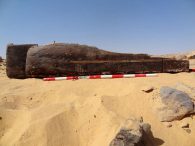Tag: Egypt
-

World Travel Market: Tourism in Egypt, Greece, Turkey ‘Getting Back on Track’
Tourism “could be getting back on track” in Egypt, Turkey and Greece, according to an industry report released by the World Travel Market on Monday. “After a difficult couple of years, the signs are that Egypt, Greece and Turkey are back on the agenda, while Tunisia is starting to turn the corner,” said Simon Press,…
-

Egypt Tourism ‘Will Recover,’ Return to Pre-2011 Levels Next Year: World Travel Council Official
Egyptian tourism will “return rapidly” to its pre-2011 levels by early 2017, World Travel and Tourism Council (WTTO) chairman David Scowsill said during the fifth Global Summit on City Tourism, held in Luxor. According to privately-owned El-Watan newspaper, Scowsill praised the newly imposed security measures at Egypt’s airports and said he would report what he has…
-

Two new pharaonic cemeteries discovered in Aswan
Two rock-carved cemeteries belonging to the Late Period of ancient Egypt have been discovered close to the shrine of Agha Khan, located west of Aswan, the Antiquities Ministry said in a press release on Monday. Nasr Salama, head of the ministry’s department for Aswan and Nubia antiquities, said the two cemeteries were badly preserved, with…
-

Egypt’s Grand Museum, National Museum of Egyptian Civilization to have separate management
Prime Minister Sherif Ismail issued a ministerial decree to establish two independent General Authorities for the Grand Egyptian Museum (GEM) and the National Museum of Egyptian Civilization (NMEC) under the supervision of the antiquities ministry. Minister of Antiquities Khaled El-Enany said the decree states that every authority would have its own board of trustees composed…
